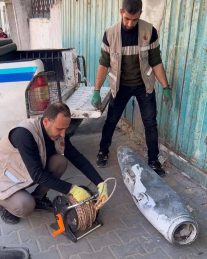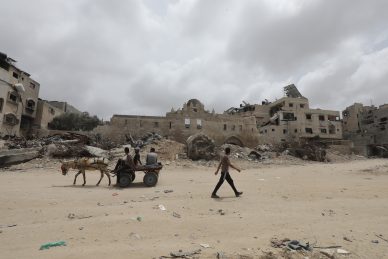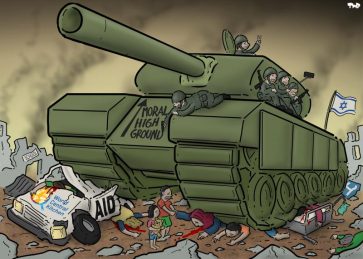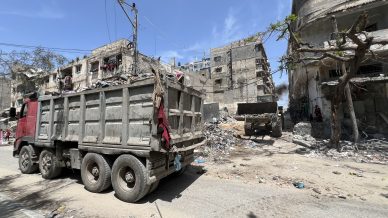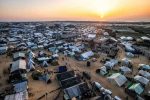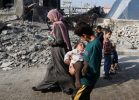GAZA, (PIC)
“I couldn’t find my specific medications for thyroid treatment, causing indescribable suffering,” with these words accompanied by pain, citizen Suhail Al-Breem expressed his suffering in searching for several medications in pharmacies in the city of Deir Al-Balah, but to no avail, amid a severe shortage of various types of medications due to the ongoing genocide war on the Gaza Strip for more than half a year.
Al-Breem, who was displaced from Jabalia refugee camp to the city of Deir Al-Balah in central Gaza Strip, told the PIC he cannot live his normal life without taking these medications, confirming that the suffering is indescribable in searching for medications, and that he went to more than 5 pharmacies but in vain.
In his pharmacy in Mawasi Khan Yunis, pharmacist Alaa Al-Khatib says that what is happening is “catastrophic; as not all types of medications are available, especially for chronic illnesses such as heart diseases, hypertension, diabetes, and cancer (…) There is a shortage of children’s medications, antibiotics, and even painkillers, even alternative medications that may help in some cases, have run out several months ago.”
Kidney patients
Searching for medications is just one form of the suffering of the people of the Strip on the health side; where patients and wounded face pain and death every day, especially kidney patients.
In the artificial kidney room at Al-Aqsa Martyrs Hospital, kidney patients lie without care and resources, with a voice overwhelmed by fatigue and exhaustion, patient Mohammed Abu Salah says, “We are tired and our health is declining, and we die every day, and the doctors have nothing to offer.”
Abu Salah continues in his conversation with our correspondent, “Now we do dialysis only for two hours every 3 days, instead of 6 hours every two days, and this has led to an increase in our suffering and the death of some patients.”
For his part, Dr. Iyad Abu Al-Tayyur said, “The medical sector is suffering from a real shortage for kidney patients, as all kidney patients in the Strip have gathered at Abu Yousef Al-Najjar Hospital, which is fundamentally unqualified to accommodate these numbers. On normal days before the war, less than 100 renal failure patients used to come to the hospital, but today between 400 to 500 cases come daily.”
In a press statement, Dr. Abu Al-Tayyur added, “There is a shortage of equipment used for kidney dialysis, which leads us to lose one or more renal failure patient every day,” pointing to the lack of availability of essential medications for kidney failure patients, most importantly iron and calcium tablets, and stressing that “if they remain unavailable, we will lose all our patients.”
Abu Al-Tayyur explained that “poor dietary habits are one of the reasons for the deterioration of the health situation for patients, as the majority of the population relies on canned food, which leads to increased kidney function and toxin accumulation, reflecting on the patient’s health.”
The Ministry of Health announced that the death toll of kidney patients in the Gaza Strip since the beginning of the ongoing Israeli aggression on the Gaza Strip, since October 7th last year, has risen to 20 patients.
Since the start of the genocidal war in the Gaza Strip, hospitals and health centers have been targeted by the Israeli war machine, and they have been the scene of insane incursions and terrible massacres, leading to the closure of 32 hospitals and health centers.
Suffering and death
On the other hand, the Palestinian Center for Human Rights warned of the continued suffering of Gaza patients, especially those with hematologic and genetic diseases, due to the severe and dangerous shortage of their medications, and the serious repercussions that threaten their lives with the continuation of the war aggression for the seventh consecutive month.
The center also urgently called on the international community and its humanitarian organizations to assume full responsibility after recording a number of deaths among patients who have not received their medications for several months due to the tightening of the Israeli blockade on the Gaza Strip, especially in Gaza City and its northern areas. This is due to the Israeli refusal to allow free entry for medication shipments in sufficient quantities, in clear violation of Articles 55-56 of the Fourth Geneva Convention.
The center confirmed the existence of real evidence indicating that the Israeli occupation forces (IOF) insist on forcing hundreds of patients to move from the northern Gaza Strip to its southern parts. Meanwhile, they dealt a severe blow and destroyed the two most important medical complexes in the Gaza Strip, namely Al-Shifa Medical Hospital and Nasser Medical Hospital, which means eliminating the hopes of patients to receive appropriate medical services in all areas of the Gaza Strip. This action amounts to the perpetration of a genocide crime, including subjecting the population of the Strip, including patients, intentionally to living conditions aimed at total or partial moral and material destruction, according to Article 2 of the Convention on the Prevention and Punishment of the Crime of Genocide of 1948.
According to the center’s follow-up, 305 thalassemia patients, including 80 children, suffer from the loss of important drug varieties for their condition such as “EXJADE” and “DESFERAL,” which are prescribed for them for life. The unavailability of those drugs poses a threat to their lives.
Doctors affirm that the symptoms and complications of patients’ discontinuation of these medications slow down their return to stable health in the near term and pose a real danger to their lives, especially if iron accumulates in their bodies. Iron accumulation in the pancreas leads to type 1 diabetes, accumulation in the liver causes fibrosis, and deposition in the heart is one of the leading causes of death for thalassemia patients.
As a result, 18 thalassemia patients have died since the start of the Israeli aggression, while about 10 patients are fighting death after their health deteriorated.
Most of these patients resorted to hospitals at the beginning of the aggression to be close to medical follow-up places, and with the targeting of these hospitals, two patients were killed. The remaining patients face the risk of death due to the severe shortage of medications and medical supplies, especially 63 patients who remain in Gaza City and its north.
Additionally, around 105 patients suffer from a rare genetic disorder called “hemophilia,” which causes longer bleeding periods after injury than normal people. Patients require lifelong medications, and since the early days of the aggression, hemophilia patients have faced many challenges, including medication shortages leading to organ and tissue damage in patients, as well as weak medical follow-up after the departure of 2 out of 5 doctors who follow up on genetic blood diseases.
These patients are the most affected by the current aggression, as they are at risk of death due to the difficulty of obtaining their medications, including pain relievers.
Continued aggression has resulted in the deaths of 23 cystic fibrosis patients out of 360 patients since the beginning of the Israeli aggression. Cystic fibrosis is a genetic disorder that causes severe damage to the lungs, digestive system, and other organs in the body.
Patients in the aforementioned category need many medications and chronic treatments, as well as varieties of therapeutic milk and all types of vitamins. The depletion of these medications poses a significant risk to their lives. Some of these patients in critical condition have been evacuated from Gaza City and its north for medical follow-up in hospitals in the southern Gaza Strip, which did not provide any medical services to them due to the catastrophic conditions they faced. About 20 critically ill patients were decided to be transferred for treatment outside the Gaza Strip, but only 6 cases have succeeded in leaving the Gaza Strip for treatment so far.
Among these cases was Malak Jamal Hassan (22 years old), whose condition deteriorated due to medication shortages and the difficult conditions imposed by the Israeli aggression on patients in the Gaza Strip, necessitating her transfer to Egypt for appropriate treatment. Meanwhile, her sister Alaa (24 years old), who suffered from cystic fibrosis, passed away.
According to their father, Jamal Saadat Hassan (52 years old), his daughters were coping with their illness by adhering to the appropriate treatment regimen, despite the difficulty of providing some medications before the current Israeli aggression. However, after their discontinuation of their medications, their condition worsened over the past few months.
Their father added in his testimony to the Palestinian Center for Human Rights, “I could not provide medications for my daughters, especially with the inability of all patients to access specialized treatment centers. So, we went to the European Gaza Hospital for medical follow-up, but the lack of a specialized medical team after the departure of many doctors prevented them from receiving appropriate treatment. Therefore, medical transfer procedures were initiated for them, but Alaa’s condition deteriorated, and she passed away on January 9, 2024, and due to the slow mechanism of patient transfer and its procedures, Malak was delayed until she managed to travel on April 9, 2024.”


